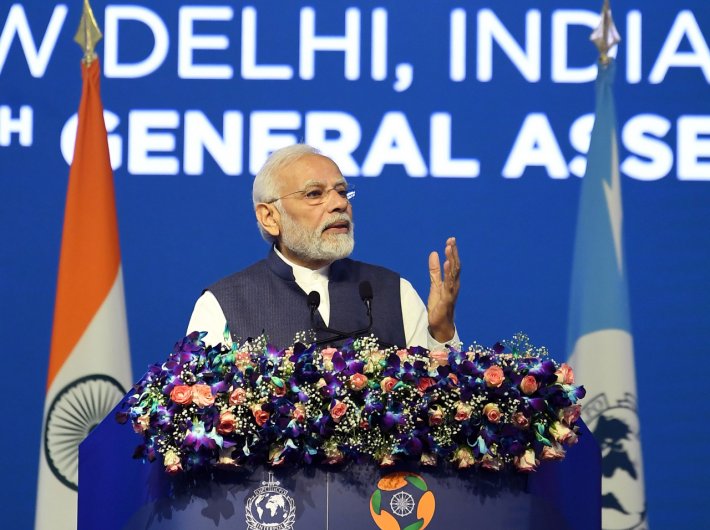Exhorts global community to work “even faster” to eliminate safe havens for corruption, terror funding
From climate targets to COVID vaccines, India has shown willingness to take the lead in any kind of crisis, Prime Minister Narendra Modi has said, adding, “And now, at a time when nations and societies are becoming inward-looking, India calls for more, not less, international cooperation. Global cooperation for local welfare – is our call.” He was addressing the 90th INTERPOL General Assembly here Tuesday.
“The concept of INTERPOL finds a connect with various aspects of Indian philosophy. The motto of the INTERPOL is: connecting police for a safer world,” he said and quoted a verse from the Vedas which means “let noble thoughts come from all directions”.
“This is a call for universal cooperation to make the world a better place. There is a unique global outlook in India’s soul. This is why: India is one of the top contributors in sending brave men and women to the United Nations Peacekeeping operations. Even before our own independence, we made sacrifices to make the world a better place. Thousands of Indians fought and died in the world wars.”
Home minister Amit Shah, Interpol president Ahmed Naser Al-Raisi, Interpol secretary general Jurgen Stock and CBI director S.K. Jaiswal were among those present. The PM noted that the global organization is also approaching a historic milestone – in 2023, INTERPOL will be celebrating 100 years of its founding. “This is a good time to rejoice and reflect. Learn from setbacks, celebrate victories, and then, look to the future with hope.”
He noted that over the last 99 years, the INTERPOL has connected police organizations globally across 195 countries. “This is despite differences in legal frameworks, systems and languages. In recognition of this, a commemorative stamp and coin have been released today.”
Modi referred to the philosophy of law enforcement is “best explained by Chanakya, the ancient Indian philosopher”, which holds that the material and spiritual welfare of a society is through law enforcement. It “helps in gaining what we do not have, protecting what we have, increasing what we have protected, and distributing it to the most deserving”. He termed it an “inclusive view” of law enforcement.
Speaking about policing in India, he said the Indian police at the federal and state levels cooperate to implement more than 900 national and around 10,000 state laws. “Add to this, the diversity of India’s society. People from all the major religions of the world live here. There are hundreds of languages and dialects spoken. Massive festivals attract millions of devotees. For example, Kumbh Mela, the largest and longest spiritual mass gathering in the world, had 240 million pilgrims. With all this, our police forces work while respecting the diversity and rights of the people promised by the Constitution. They not only protect the people but also serve our democracy. Take the scale of India’s free, fair and massive elections. Elections involve arrangements for around 900 million electors. This is close to the population of North and South American continents taken together. About 2.3 million police personnel are deployed to help with the elections. In upholding diversity and democracy, India is a case study for the world.”
He also spoke of the challenges: “Despite all the past successes, today, I want to remind the world about a few things. There are many harmful globalised threats that the world faces. Terrorism, corruption, drug trafficking, poaching and organised crime. The pace of change of these dangers is faster than earlier. When threats are global, the response cannot be just local! It is high time that the world comes together to defeat these threats.”
Pointing out that India has been combating trans-national terrorism for several decades, he said, “Long before the world woke up to it, we knew the price of safety and security. Thousands of our people made the ultimate sacrifice in this fight. But it is no longer enough that terrorism is fought only in the physical space. It is now spreading its presence through online radicalisation and cyber threats.”
Modi underlined the need to develop international strategies to combat this phenomenon. “Establishment of early detection and warning systems, protecting transportation services, security for communication infrastructure, security for critical infrastructure, technical and technological assistance, intelligence exchange, many of these things need to be taken to a new level.”
He also named corruption as a dangerous threat, as corruption and financial crimes have harmed the welfare of the citizens of many countries. “This is one of the major sources of terror funding. From illegal drugs that destroy young lives to human trafficking, from weakening democracies to the sale of illegal arms, this dirty money funds many destructive enterprises.”
He exhorted the global community to work “even faster” to eliminate safe havens. “There can be no safe havens for the corrupt, terrorists, drug cartels, poaching gangs or organized crime. Such crimes against people in one place are crimes against everyone, crimes against humanity. Further, these not only harm our present but also impact our future generations. Police and law enforcement agencies need to devise procedures and protocols to increase cooperation. INTERPOL can help by speeding up Red Corner Notices for fugitive offenders.”
